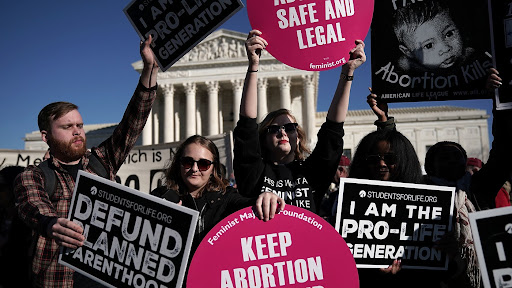Gen-Z: Not a Bunch of Liberals (Sort Of)

Activists both supporting and opposing abortion rights gathered in front of the the Supreme Court during the March for Life on Jan. 19.
Image Courtesy of Alex Wong of Getty Images
By Christian Rubio
A group of over 2,000 people was polled on their support in the 2020 presidential election; 87% of them supported now-President Biden; former President Trump finished third among them, receiving 6.3% support to second-place Green Party candidate Howie Hawkins’ 6.7%. Surely this poll must have been taken within the Democratic Party itself; where else could you find that kind of sample? The answer is Harvard University’s incoming class of 2025.
This supports the common perception at large that Generation Z, the generation born from the mid-to-late 1990s to the early 2010s, is overwhelmingly liberal. However, an article from FiveThirtyEight makes the case that while Gen-Z is certainly majority liberal, it is far more complicated than most people often think. Their research found that the Republican-Democrat divide between voting-age Gen-Zers (ages 18-24) is a good deal different depending upon the particular issues in question. On social issues, there is certainly a large liberal majority, but on economic issues, there is a much stronger Republican base.
The majority of Gen-Z in general, but more specifically Gen-Z Republicans polled supported LGBTQ rights, marijuana legalization, and investing in technology to combat climate change. A majority of these young Republicans also opposed restrictions on all abortions. (It should be noted, however, that abortion is one of the most difficult issues to poll; for example, according to Gallup, 43% of Americans consider themselves pro-life, but only 32% support overturning Roe v. Wade.)
Where young Republicans really find a home with the GOP is on economic issues and a couple of social issues. On the issues of raising the minimum wage to $15 an hour, ensuring college students graduate debt-free, raising taxes on families making over $600,000 a year, and bans on assault weapons, the gaps between Gen-Z Republicans and Democrats were all over 30%.
So it seems that while Gen-Z voters have a strong liberal presence and reputation on social media, as well as in elite higher education, there is a much more complex and interesting story to be told as a whole. Efforts to fit Gen-Z into the categories and factions of older generations risk ignoring the nuances of our generation and how we view politics.
Readers will also be interested in the political landscape here at CUA, so The Tower conducted a small survey of 45 students asking eight questions about their general political alignment and about their opinions on a few key issues. The survey found a strong conservative majority, and smaller but still sizable Republican and pro-Trump majorities.
Of the students surveyed, 73% considered themselves conservative, almost equally split between “very conservative” and “somewhat conservative.” 60% identifed with the GOP, with more not identifying with either party (22.2%) than with the Democratic Party (13.3%). 62.2% supported former President Trump in the 2020 election, with Biden supporters (15.6%) slightly outnumbered by those not supporting either candidate (17.8%).
The students surveyed were solidly pro-life, with 56.8% saying that abortion should never be permissible and another 20.5% only finding it permissible in the cases of rape, incest, or severe threat to the mother’s life, a tiny minority of all abortions. Only 9.1% of respondents found abortion permissible until birth.
On economic issues, 60% considered themselves fiscally conservative, with slightly more identifying as “very fiscally conservative” (31.1%) than “somewhat fiscally conservative” (28.9%). 24.4% marked “not sure,” and 13.3% identified as fiscally liberal or progressive; interestingly, not a single respondent identified as “very fiscally liberal/progressive.”
On marijuana legalization, those who took a stance were almost split, with only 2.2% more supporting it than not supporting it. 47.7% opposed assault weapon bans, with 29.5% supporting them and the rest not taking a stance. Respondents were overwhelmingly concerned with people being silenced for their political beliefs (“cancel culture”); 95.5% saw it as an important threat in America, with 61.4% considering it a “very important” threat.
Given the small sample size, this survey should not be taken as a precise representation of the student body at CUA, but it is safe to say that this campus is more conservative than most college campuses in America, especially those of the Ivy League and other elite universities. Because these elite institutions attract the most media and public attention, it is easy to think that they represent all college students in America, but upon closer examination, it is clear that there is much more ideologically diversity in Gen-Z at large and here at CUA.








